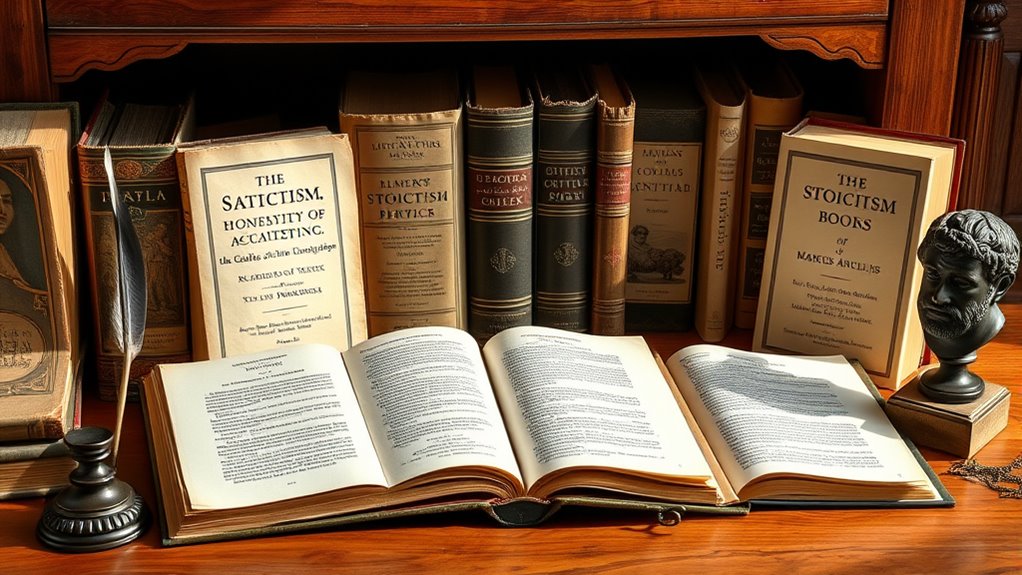To master Stoic philosophy, start with essential texts like Marcus Aurelius’ *Meditations*, Seneca’s *Letters*, and Epictetus’ *Discourses*, which offer timeless wisdom. Incorporate practical guides such as *The Daily Stoic* and *A Guide to the Good Life* to apply principles daily. Explore biographies of Stoic figures and modern adaptations to see how their teachings live on. Keep exploring to uncover deeper insights and strategies for resilience and virtue.
Key Takeaways
- Include foundational texts like Marcus Aurelius’s *Meditations*, Seneca’s *Letters*, and Epictetus’s *Discourses*.
- Highlight beginner-friendly books such as *The Daily Stoic* and *A Guide to the Good Life*.
- Cover modern interpretations and practical guides that apply Stoic principles to daily life and resilience.
- Recommend supplementary materials like biographies and historical context to deepen understanding.
- Emphasize resources that integrate Stoicism into therapy, mindfulness, and personal development practices.
Classic Texts and Translations

Classic texts and translations form the foundation of Stoic philosophy, offering timeless wisdom from key figures like Marcus Aurelius, Seneca, and Epictetus. These works address ethical dilemmas, guiding you on moral choices and virtuous living. They also explore metaphysical debates about nature, fate, and the universe, helping you understand your place in the cosmos. Engaging directly with these original writings or reputable translations allows you to grasp Stoic insights into resilience, self-control, and rationality. Additionally, studying ancient texts can enhance your understanding of philosophical concepts, enriching your perspective on life’s big questions or everyday moral challenges. Exploring ethical principles within these texts helps build a strong moral framework for everyday decision-making. Developing a personal growth techniques mindset while engaging with these writings can deepen your insight and foster self-improvement. Whether contemplating life’s big questions or everyday moral challenges, these texts provide essential perspectives to deepen your understanding of Stoic principles. Moreover, immersing yourself in historical context can offer valuable insights into how these philosophies were applied in their own time, illuminating their relevance today. Gaining knowledge of the cultural background of these works can further enrich your appreciation and interpretation.
Philosophy as a Daily Practice

Adopting philosophy as a daily practice transforms abstract ideas into tangible habits that shape your character. You can incorporate mindful reflection into your mornings or evenings, questioning your actions and motivations. Establish daily rituals, like journaling Stoic principles or meditating on virtue, to reinforce your values. These routines help you internalize Stoic teachings, turning theory into lived experience. Consistency is key—you’ll gradually develop resilience, self-control, and clarity. By making philosophy part of your everyday life, you cultivate a resilient mindset that guides your decisions, improves your relationships, and sustains you through life’s challenges. Embracing mindful reflection can also enhance your ability to think innovatively and adapt to new situations, enriching your philosophical journey. Paying attention to currency fluctuations can sharpen your awareness of market dynamics, helping you make more informed financial decisions. Incorporating diverse media, such as films and books, can further deepen your understanding and application of Stoic principles in various contexts. Recognizing the importance of emotional health and addressing it through daily practices can also support your overall well-being and resilience.
Beginner-Friendly Resources

For newcomers exploring Stoicism, accessible resources can make the philosophy easier to understand and apply. *The Daily Stoic* offers daily insights and exercises drawn from famous Stoic thinkers like Marcus Aurelius, Seneca, and Epictetus, making it perfect for beginners who want bite-sized lessons. These resources help you develop emotional resilience by teaching you to manage feelings and face ethical dilemmas with clarity. Sleep and mental health are closely linked, and understanding how proper rest impacts emotional regulation can enhance your practice of Stoic principles. *A Guide to the Good Life* by William Irvine provides practical advice for living ethically and cultivating inner peace. Starting with these beginner-friendly tools makes grasping Stoic principles more approachable and relevant to everyday challenges. Additionally, understanding mental resilience techniques can help you better cope with life’s stresses by applying Stoic discipline to emotional responses. Recognizing the connection between mindfulness and acceptance can further support your emotional stability in practicing Stoicism.
Resilience and Modern Applications

Have you ever wondered how Stoic principles can help you navigate life’s toughest challenges? They’re essential for building emotional resilience and mental toughness. Stoicism teaches you to focus on what you can control, accept setbacks, and maintain inner stability amid chaos. Books like *The Obstacle is the Way* show how turning obstacles into opportunities strengthens your character. *Courage Under Fire* demonstrates resilience through real-life adversity. By applying these ideas, you develop a resilient mindset that stays calm in crises and adapts to change. Recognizing and learning from small mistakes can further improve your ability to handle adversity. Modern Stoicism isn’t just philosophy; it’s a practical toolkit for overcoming difficulties and thriving in today’s complex world.
Biographies and Historical Context

Ever wonder how understanding the lives behind Stoic texts can deepen your appreciation of their teachings? Biographies and historical context reveal how Stoics faced moral dilemmas and wielded political power. For example, Seneca’s life at Nero’s court highlights the tension between virtue and political survival. Exploring these stories helps you see how Stoics navigated complex power struggles and moral challenges, applying their philosophy in real-world situations. These insights show that Stoic principles weren’t just abstract ideas—they were lived experiences amid turmoil and influence. Recognizing the influence of historical circumstances provides a more nuanced view of their actions and decisions. Additionally, understanding the personal experiences of Stoics can shed light on how their philosophies evolved during times of crisis, illustrating the practical application of their teachings. Considering environmental factors can also reveal how external conditions impacted their choices and resilience. Moreover, examining notable quotes from these figures can offer a direct window into their mindset and motivations during pivotal moments. Analyzing cultural influences helps contextualize their philosophies within the broader societal values of their time.
Contemporary Interpretations of Stoicism

Contemporary interpretations of Stoicism have made the ancient philosophy more accessible and relevant to today’s audiences by blending traditional principles with modern psychology and everyday challenges. You’ll find concepts like modern mindfulness integrated into Stoic practices, helping you stay present and resilient. Ethical pragmatism guides how you apply Stoic virtues practically, emphasizing realistic and adaptable behavior rather than rigid ideals. These interpretations focus on mental well-being, emotional regulation, and personal growth, making Stoicism a practical tool for maneuvering modern life. They bridge the gap between ancient wisdom and current needs, empowering you to find calm and purpose amid chaos. Additionally, incorporating essential oils into daily routines can enhance your emotional resilience and support overall well-being. Embracing emotional regulation techniques rooted in both ancient and modern insights can further deepen your mastery over reactive impulses. Recognizing the influence of personal debt forgiveness bills and financial literacy can also contribute to a more balanced and stress-free mindset, aligning your financial health with your mental resilience.
Stoic Exemplars and Their Legacies

The enduring influence of Stoic exemplars demonstrates how their lives embody the principles they taught, leaving a lasting legacy that continues to inspire today. These figures, like Cato and Seneca, exemplify heroic virtues—wisdom, courage, justice, and temperance—and serve as models of leadership ideals. Their unwavering commitment to virtue under pressure highlights the importance of integrity, resilience, and moral clarity. By studying their lives, you learn how to apply Stoic principles in real-world challenges, fostering strength and character. Their legacies remind you that true leadership arises from living in accordance with virtue, regardless of external circumstances.
Fiction and Cultural Influences

Fiction has played a significant role in shaping how Stoic principles are understood and appreciated in modern culture. Mythical archetypes and cinematic adaptations bring Stoic virtues to life, making them relatable and accessible. Through stories, you see characters embody resilience, self-control, and virtue, illustrating Stoic ideas vividly. Films and novels often depict heroes facing adversity with calm and clarity, reinforcing Stoic ideals. These cultural influences help you internalize Stoic ethics beyond textbooks. They inspire reflection and practice in everyday life, connecting ancient philosophy with contemporary storytelling.
| Mythical Archetypes | Cinematic Adaptations |
|---|---|
| Heroes embodying virtue | Films depicting resilience |
| Tragedies illustrating acceptance | Stories of self-control |
| Mythic journeys of growth | Characters facing adversity |
| Wise mentors guiding | Modern heroes practicing Stoicism |
| Archetypes of calm and wisdom | Inspirational Stoic narratives |
Stoic Principles in Therapy and Psychology

Many stories of heroes and wise mentors in modern media showcase Stoic virtues like resilience, self-control, and acceptance, making these ideas more relatable. In therapy and psychology, Stoic principles are increasingly integrated through mindfulness techniques and emotional regulation strategies. You learn to observe your thoughts without judgment, fostering a calmer mind. This mindfulness integration helps you recognize emotional triggers and respond rationally rather than react impulsively. By applying Stoic ideas, you develop resilience against life’s setbacks and improve mental clarity. These practices empower you to master your emotions, reduce stress, and cultivate a balanced, Stoic mindset that enhances overall well-being.
Scholarly Works and In-Depth Studies

Scholarly works and in-depth studies deepen your understanding of Stoicism by examining its historical development, core concepts, and ongoing debates. They explore key areas like meditative techniques, ethical dilemmas, and philosophical evolution. For example:
Scholarly works deepen your understanding of Stoicism’s history, core ideas, and ongoing debates.
- Analyzing ancient texts’ interpretations and translations
- Investigating Stoic responses to modern ethical challenges
- Comparing Stoic practices with contemporary therapies
- Exploring debates on emotions and rational mastery
These studies help you grasp how Stoic principles apply today, especially in managing ethical dilemmas and cultivating resilience through meditative techniques. They provide the rigorous foundation needed to deepen your practical understanding of this enduring philosophy.
Frequently Asked Questions
How Can I Start Practicing Stoicism Without Reading Heavy Texts?
You can start practicing Stoicism without heavy texts by focusing on practical exercises and daily routines. Begin with simple habits like journaling your thoughts, reflecting on what’s within your control, and practicing gratitude. Use accessible resources like *The Daily Stoic* for daily insights and exercises. Incorporate mindfulness and resilience practices into your routine, gradually building a Stoic mindset through consistent, real-life application rather than complex reading.
What Are the Common Misconceptions About Stoic Emotions?
Many misconceptions about emotions suggest Stoics suppress or ignore feelings, but that’s not true. Instead, Stoicism teaches emotional resilience by understanding and managing emotions rationally. You don’t have to eliminate feelings, but you learn to avoid being controlled by them. This approach helps you develop inner strength, face challenges calmly, and maintain virtue. So, it’s about mastering emotions, not suppressing them, for a more balanced and resilient life.
Which Stoic Figure Best Suits Modern Personal Development?
Imagine finding a guiding star in the vast night sky—Ryan Holiday shines brightly as a Stoic role model for modern personal development. His approach marries ancient wisdom with contemporary application, showing you how to turn obstacles into opportunities. Holiday’s work demonstrates that Stoic principles aren’t just old stories; they’re practical tools for resilience, clarity, and growth today. Embrace his insights, and you’ll see Stoicism’s relevance in your life’s journey.
How Does Stoicism Compare to Other Philosophical Schools?
You might find that Stoicism differs from other schools because it emphasizes virtue ethics and practical wisdom, focusing on living in accordance with reason. Unlike some philosophies that prioritize metaphysics or spiritual beliefs, Stoicism promotes logical reasoning to develop self-control and resilience. It’s about cultivating character and inner peace through disciplined thought and action, making it highly applicable for personal growth and steering through life’s challenges effectively.
Can Stoic Principles Help With Everyday Stress and Anxiety?
You can definitely use Stoic principles to handle everyday stress and anxiety. By practicing mindfulness techniques, such as focusing on what’s within your control, you build emotional resilience. Stoicism teaches you to accept external events without overreaction and to reflect on your responses. This mindset helps you stay calmer, more centered, and better equipped to face daily challenges with clarity and strength.
Conclusion
Think of this guide as your map through a vast, timeless forest of Stoic wisdom. Each book and resource is a path leading to greater resilience, peace, and ethical living. By exploring these texts, you’re planting seeds of strength that will grow through daily practice and reflection. Embrace the journey, and watch how these ancient principles transform your modern life into a resilient, serene sanctuary. Your adventure into Stoicism starts now—step forward with confidence.









